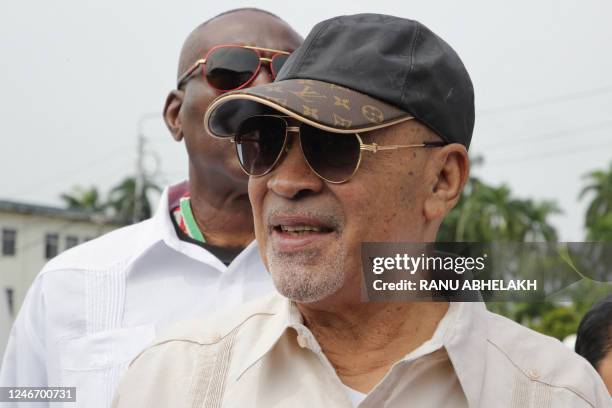Ten Things to Know About Desi Bouterse, The Late Former President and Fugitive of Suriname
 29 December 2024
29 December 2024


News Americas, NEW YORK, NY, Fri. Dec. 27, 2024: Desi Bouterse, a polarizing figure in Suriname’s history and its former President, left behind a legacy marked by dictatorship, populism, and controversy. Here are ten things to know about him in his death:

Military Coup Leader: Desi Bouterse, was born in Domburg, Suriname. Bouterse was born into a multiracial family of Amerindian, African, Dutch, French, and Chinese descent. Raised by his aunt in Paramaribo after moving from Domburg, he attended local schools but did not complete his education. In 1968, he moved to the Netherlands, joined the Dutch armed forces, and trained as a non-commissioned officer. A skilled athlete, he captained a basketball team during his training.
In 1970, he married Ingrid Figueira, his teenage sweetheart from Suriname, and they had two children, Peggy and Dino. Following his military service, he was stationed in Germany before returning to Suriname with his family in 1975 after the country’s independence. He aimed to contribute to building the Surinamese army and became chairman of a new military union in 1979, setting the stage for his rise to power.
On February 25, 1980, Desi Bouterse, along with Roy Horb and fourteen other sergeants, orchestrated the “Sergeants Coup,” overthrowing the Henck Arron government. Known as the Groep van zestien (Group of Sixteen), they installed Bouterse as the chairman of the National Military Council, making him the de facto dictator of Suriname. From 1980 to 1988, he held power through puppet presidents he controlled.
The coup, initially popular among citizens, was justified as a fight against corruption and unemployment. However, historian Rosemarijn Hoefte noted the lack of clear political or ideological planning behind it. On the day of the coup, Bouterse’s forces burned down the Central Police Station, now a “Monument of the Revolution,” commemorated annually on February 25.
The military regime imposed strict curfews, curtailed press freedoms, and, by 1985, banned political parties while heavily censoring public assembly. The dictatorship was marked by corruption and brutality, including the 1982 December Murders of 15 political opponents, which led to the closure of the University of Suriname.
Though Bouterse forged ties with Cuba, North Korea, and the Soviet Union, his regime avoided Communist ideology. Relations with the Netherlands soured, leading to a suspension of aid and deepening economic crises, worsened by falling bauxite prices. Rising instability and uprisings ultimately challenged his grip on power.
Infamous “December Murders”: In 1982, he ordered the torture and execution of 15 political dissidents, including journalists, academics, and lawyers. This event traumatized Suriname and strained its international relations.
Civil War Instigator: His rule sparked a guerrilla war led by his former bodyguard, Ronnie Brunswijk, resulting in a bloody civil conflict that ended his dictatorship.
Transition to Democracy: Suriname returned to civilian rule in 1988, but Bouterse remained influential, leading the National Democratic Party (NDP).
Convicted Drug Trafficker: In 1999, Bouterse was convicted in absentia by a Dutch court for cocaine trafficking.
Populist President: Despite his past, Bouterse became Suriname’s president in 2010 and was re-elected in 2015, using populist rhetoric to gain support.
Institutional Changes: As president, he shifted alliances away from the Netherlands toward China and Venezuela, while appointing family members to government positions.
Murder Conviction: In 2019, he was convicted for his role in the December Murders and sentenced to 20 years in prison, a decision upheld in 2023.
Fugitive Status: In January 2024, instead of surrendering to authorities, Bouterse went into hiding, evading his prison sentence.
Death at 79: Desi Bouterse died on December 24, 2024, as a divisive figure, remembered as both a national hero and a brutal dictator.




